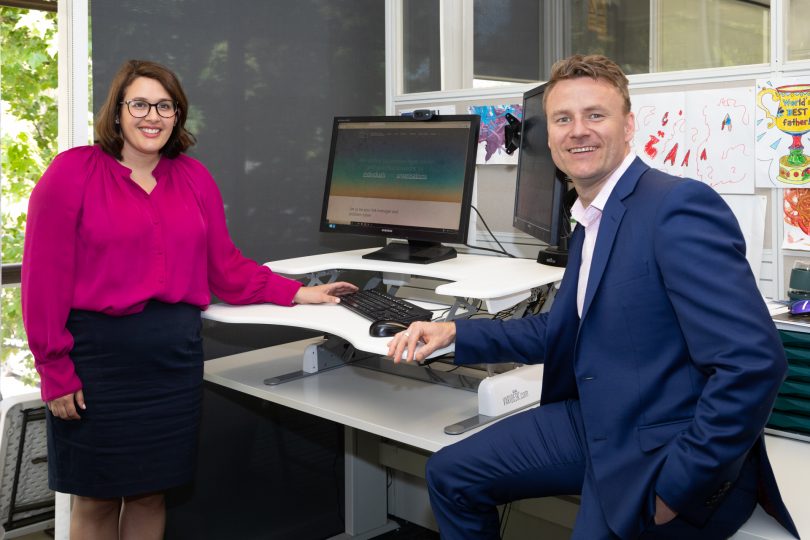
Snedden Hall & Gallop’s Kirsten Cameron and Sam Irvine say young people should take some time to find their career. Photo: Region Media.
As the end of the year approaches, thousands of school leavers will be facing the task of choosing a pathway to their future jobs. For those who wish to take up a trade or profession such as plumbing, hairdressing, nursing or becoming a lawyer, the path is pretty simple: get the qualifications and get the job.
But there are hundreds of interesting and satisfying jobs that don’t require prescriptive qualifications and many people leave school and university with no idea what they want to do. So how do you find a great career that isn’t on the list?
Two young Canberrans who have taken a rather circuitous route to their present roles have some advice for people who aren’t sure what to do: just jump in and make a start.
Snedden Hall & Gallop’s commercial and marketing manager, Sam Irvine, says the course you do at university or TAFE does not necessarily determine your career path.
“Any degree can shape you but that doesn’t determine the industry you will work in,” he says. “Eventually you will be able to let your skills take the lead rather than your education.”
Speaking from experience, Sam says he never imagined he would be working in marketing at a law firm. He moved to Canberra when he was 13 years old and worked in his family’s fruit shops for most of his life. After leaving school, he chose to study law and sports management at the University of Canberra, and given his first passion was to become a lawyer, he was surprised to find the sports management course more to his liking.
On completing his degree, Sam worked in various jobs, including working in logistics for the Australian rowing team at the Beijing Olympic Games. He says he landed his current job with Snedden Hall & Gallop using the skills he has gained over the years to match the job description.
“It wasn’t my qualifications they were after, it was my skills,” says Sam.
READ ALSO: New lawyers admitted after clearing final COVID-19 hurdle
“At school and university, the focus is on the person with the highest grades, but in reality you do not have to be the smartest person in the room to do the best job. Being a people person, having good communication skills and problem-solving ability are skills employers value. And you don’t necessarily get those from a university degree.
“You learn a lot of theory at university, but what is applied in the working world is often very different. If you have a solid understanding of the industry and have good skills, you can learn the rest on the job.”
Sam’s advice for people starting out: “Don’t worry too much about the course you choose. Any tertiary study will demonstrate to an employer that you are capable of critical thinking, that you can process information, be organised and meet deadlines.

Sam Irvine says the course you do at university or TAFE does not necessarily determine your career path. Photo: Supplied.
“Once you have completed your course, it is time to look outside the square. Think about your skill set and your personality, and sell that on your resume. Employers don’t tend to box people in; they want the best fit for their workplace and someone who has the skills to do the job.”
As a school leaver, Snedden Hall & Gallop events manager Kirsten Cameron never imagined she would be working for a law firm let alone in an office.
“I absolutely love my job now, but when I left school I certainly didn’t picture myself working in an office,” she says.
Kirsten studied teaching at the University of Canberra, but after finishing her degree she decided to look at other opportunities outside of education.
“After four years of studying I was ready for a full-time job, and it seemed like education was not able to offer what I wanted,” she says. “So after hearing about an opportunity from my sister, I decided to take a position here in the accounts team.”
Nine years later, Kirsten now works as the firm’s events manager.
“They have a great culture at Snedden Hall & Gallop and I fitted in straight away,” she says. “Working with a great team is the best part of my working life.
“A lot of people feel pressured to choose a career early and then think that what they study is their only pathway to a satisfying career. But some people may be better off being open to trying different jobs and, even if they don’t like it, they will gain good experience that will help them find the next job.
“Just jump in. There are no wrong choices; you don’t have to get it right the first time.”
For more information, visit Snedden Hall & Gallop.
This is a sponsored article, though all opinions are the author’s own. For more information on paid content, see our sponsored content policy.













